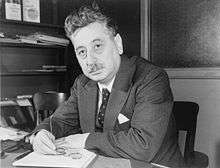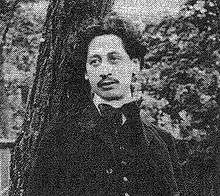Sholem Asch
| Sholem Asch | |
|---|---|
 Sholem Asch, 1940 | |
| Born |
Szalom Asz 1 November 1880 Kutno, Congress Poland, Russian Empire |
| Died |
10 July 1957 (aged 76) London, England |
| Nationality | Polish-Jewish |
| Other names | Szalom Asz, Shalom Asch, Shalom Ash |
| Occupation | Novelist, dramatist, and essayist |
Sholem Asch (Yiddish: שלום אַש, Polish: Szalom Asz; 1 November 1880 – 10 July 1957), also written Shalom Ash, was a Polish-Jewish novelist, dramatist, and essayist in the Yiddish language who settled in the United States.
Life and work
Asch was born Szalom Asz in Kutno, Congress Poland, one of ten children [1] of Moszek Asz (1825, Gąbin – 1905, Kutno), a cattle-dealer and innkeeper, and Frajda Malka, née Widawska (born 1850, Łęczyca), and received a traditional Jewish education until, as a young man, he followed that with a more liberal education obtained at Włocławek, where he supported himself as a letter writer for the illiterate townspeople.[1]
From there he moved to Warsaw, where, in 1903, he married Mathilde Shapiro, the daughter of the Polish-Jewish teacher and poet Menahem Mendel Shapiro.[1] Influenced by the Haskalah (Jewish Enlightenment), initially Asch wrote in Hebrew, but I. L. Peretz convinced him to switch to Yiddish.
He attended the Czernowitz Yiddish Language Conference of 1908, which declared Yiddish to be "a national language of the Jewish people". He traveled to Palestine in 1908 and the United States in 1910. He sat out World War I in the United States and became a naturalized citizen in 1920. He returned to Poland and later moved to France.
His Kiddush ha-Shem (1919) is one of the earliest historical novels in modern Yiddish literature, about the anti-Jewish and anti-Polish Chmielnicki Uprising in mid-17th century Ukraine and Poland.
His 1907 drama God of Vengeance (Got fun nekome) is about a Jewish brothel owner who attempts to become respectable by commissioning a Torah scroll and marrying off his daughter to a yeshiva student. Set in a brothel, the play includes Jewish prostitutes, a lesbian scene, and the hurling of a Torah across the stage. In 1923, it was translated into English, and staged on Broadway at the Apollo Theatre on West 42nd Street with a cast that included the acclaimed Jewish immigrant actor Rudolph Schildkraut. Its run was cut short after six weeks when the entire cast, along with producer Harry Weinberger, and one of the owners of the theater, were indicted – and eventually convicted – on charges of obscenity;[2] Weinberger, who was also a prominent attorney, represented the group at the trial. After a protracted battle by Weinberger, the conviction was successfully appealed.[3] In Europe, the play was popular enough to be translated into German, Russian, Polish, Hebrew, Italian, Czech, Romanian and Norwegian. Indecent, a play written by Paula Vogel, tells of those events and the impact of God of Vengeance. It opened at the Cort Theater on Broadway in April, 2017, directed by Rebecca Taichman.[4]
Asch's 1929–31 trilogy Farn Mabul (Before the Flood, translated as Three Cities) describes early 20th century Jewish life in Saint Petersburg, Warsaw, and Moscow. His Bayrn Opgrunt (1937, translated as The Precipice), is set in Germany during the hyperinflation of the 1920s. Dos Gezang fun Tol (The Song of the Valley) is about the halutzim (Jewish-Zionist pioneers in Palestine), and reflects his 1936 visit to that region.

Asch was a celebrated writer in his own lifetime. In 1920, in honor of his 40th birthday, a committee headed by Judah L. Magnes published a 12-volume set of his collected works.[1] In 1932 he was awarded the Polish Republic's Polonia Restituta decoration and was elected honorary president of the Yiddish PEN Club.
He visited Palestine again in 1936, and returned to settle in the United States in 1938. However, he later offended Jewish sensibilities with his 1939–1949 trilogy, The Nazarene, The Apostle, and Mary, which dealt with New Testament subjects. The Forward, New York's leading Yiddish-language newspaper, not only dropped him as a writer, but also openly attacked him for promoting Christianity. A translation by Michal Friedman of his major novel, The Man from Nazareth was published by Wydawnictwo Dolnośląskie (1990) in the series of Jewish-Polish writers, Biblioteka Pisarzy Żydowskich, Aleph.
Death and legacy
Asch spent most of his last two years in Bat Yam near Tel Aviv, Israel, but died in London. His house in Bat Yam is now the Sholem Asch Museum and part of the MoBY-Museums of Bat Yam complex of three museums.[5] The bulk of his library, containing rare Yiddish books and manuscripts, as well as the manuscripts of some of his own works, is held at Yale University. His sons were Moszek Asz Moses "Moe" Asch (12 February 1905, Warsaw – 19 October 1986, United States), the founder and head of Folkways Records, and Natan Asz/Nathan Asch (1902, Warsaw – 1964, United States), also a writer. His great-grandson, David Mazower, is a writer and a BBC Journalist.[6][7]
Bibliography
|
|
Discography
- In the Beginning: Bible Stories for Children by Sholem Asch (Performed by Arna Bontemps) (Folkways Records, 1955)
- Joseph and His Brothers: From In the Beginning by Sholem Asch (Performed by Arna Bontemps) (Folkways Records, 1955)
- Jewish Classical Literature: Read by Chaim Ostrowsky (Folkways Records, 1960)
- Nativity: Sholem Asch's Story of the Birth of Jesus (Performed by Pete Seeger) (Folkways Records, 1963)
- Readings from the Bible - Old Testament: Compiled by Sholem Asch (Performed by Harry Fleetwood) (Folkways Records, 1972)
- Sholem Asch: A Statement and Lecture at Columbia University, N.Y. October, 1952 (Folkways Records, 1977)
References
- 1 2 3 4 Sherman, Joseph (July 13, 2010). "Asch, Sholem". YIVO Encyclopedia of Jews in Eastern Europe. yivoencyclopedia.org. Retrieved 2017-04-08.
- ↑ "Broadway Cast of ‘God Of Vengeance’ Arrested on Obscenity Charges". English translation, by Chana Pollack, of the article that appeared in the Yiddish Forward (Forverts) on March 7, 1923. Forward. January 14, 2017. forward.com. Retrieved 2017-04-09.
- ↑ Cummings, Mike (October 15, 2015). "Defending an ‘Indecent’ play: ‘The God of Vengeance’ in the Yale University Library archives. Yale News. Retrieved 2017-04-09.
- ↑ League, The Broadway. "Indecent – Broadway Play – Original - IBDB". Ibdb.com. Retrieved 11 November 2017.
- ↑ "MoBY: Museums of Art - Visit". moby.org.il. Retrieved 2017-10-17.
- ↑ Mazower, David. "A Jewish festival in a town without Jews - BBC News". Bbc.co.uk. Retrieved 2016-12-15.
- ↑ "David Mazower". Yiddish Book Center. 2011-02-28. Retrieved 2016-12-15.
- ↑ "Sholem Asch, One Destiny: an Epistle to the Christians | Issue 22". Kesher Journal. Retrieved 2012-03-15.
- ↑ "One Destiny Part 1". Petahtikvah.com. Retrieved 2012-03-15.
- ↑ "One Destiny Part 2". Petahtikvah.com. Retrieved 2012-03-15.
- ↑ Sholem Asch. East River: A Novel of New York. Retrieved 2012-03-15.
- ↑ John Bear, The #1 New York Times Best Seller: intriguing facts about the 484 books that have been #1 New York Times bestsellers since the first list, 50 years ago, Berkeley: Ten Speed Press, 1992. pp. 21–27
Further reading
- "Sholem Asch". YIVO encyclopaedia.
- "Sholem Asch". Yale University Library Judaica Collection.
- Bell, June D. "Sholem Asch's Yiddish drama God of Vengeance (1907)". All About Jewish Theater. Archived from the original on 2012-12-09.
- "Asch, Sholem". The Columbia Encyclopedia (sixth ed.).
- Umansky, Ellen. "Asch's Passion". Mostly about Asch's controversial trilogy that began with The Nazarene.
- Tumanov, Vladimir. "Novelizing Myth in Sholem Asch's Moses." Yiddish 11(1-2): 162-184, 1998.
External links
| Wikimedia Commons has media related to Sholem Asch. |
| Wikiquote has quotations related to: Sholem Asch |
- Works by or about Sholem Asch at Internet Archive
- Works by Sholem Asch at LibriVox (public domain audiobooks)

- Sholem Asch Discography at Smithsonian Folkways
- Ben Siegel, The controversial Sholem Asch: an introduction to his fiction at Google Books, 313 pages.
- Alyssa Quint, Asch's Diamonds, A New Essay Collection Gives an Oft-neglected Master His Due, a review in The Jewish Daily Forward
- "Workbook" on the Asch-Howe Quarrel
- Biographical article of Sholem Asch by Encyclopaedia Britannica
- Sara Blacher-Retter reads A shtiler gortn and A dorf-tsadik
- A bust of Sholem Asch by Jacob Epstein, from the collection of the Israel Museum, Jerusalem